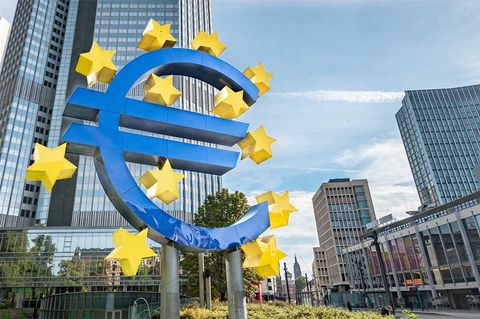Thus, the prime interest rate, which is the lowest bid rate in the refinancing procedure, remains at 0.00 percent. The deposit interest rate remained unchanged at -0.50 percent.
The expected interest rates were unchanged, according to Trading Economics forecast.
The European Central Bank also leaves the size of the PEPP quantitative easing program unchanged at 1,850 billion euros, and the program implementation period remains at least until March 2022.
As the information received confirmed the assessment of financial conditions and inflation expectations made at the March meeting, the Board expects that PEPP purchases will continue in the current quarter at a much higher rate than they have been during the first months of the year.
Continue with asset purchases
If the favorable conditions can be maintained without using the entire space in PEPP, some of them may still be unused. On the other hand, the PEPP domain can be recalibrated if required to maintain these conditions.
The European Central Bank states that purchases due under PEPP will be reinvested at least until the end of 2023.
The European Central Bank will continue to buy assets under the previous quantitative easing (APP) program at a monthly rate of € 20 billion, and they will do so as long as necessary to maintain favorable liquidity conditions.
Interest rates will be maintained at current, or lower, levels until inflation is on track with target, and is reflected in core inflation.
“The Council remains ready to adjust all its instruments, as appropriate, to ensure that inflation moves towards the target in a sustainable manner, in line with the symmetry commitment,” the European Central Bank wrote.
‘Dark look’
Vaccination and easing restrictions will lead to further growth in the Eurozone later, but in the short term, the economic outlook remains unclear due to the pandemic and the launch of the vaccine.
European Central Bank Governor Christine Lagarde said this at a press conference following the European Central Bank’s interest rate announcement on Thursday.
She said that inflation has risen in recent months due to temporary factors and high energy prices, but excess resources and weak demand are moving in the other direction.
Largarde said favorable financial conditions are crucial, but risks to financing terms remain. Therefore, they keep their policy unchanged now.
“Balanced Risks in the Medium Term”
The ECB chief said the ECB could buy smaller bonds if it met the target of favorable financing conditions anyway, but if it could also buy more if needed.
She added that the European Central Bank continues to monitor the exchange rate to see its impact on the economic outlook.
She said the risks in the short term were to the downside, but more balanced in the medium term.

“Extreme tv maven. Beer fanatic. Friendly bacon fan. Communicator. Wannabe travel expert.”









More Stories
Brexit brings economic uncertainty – Finland worst hit in the long run – Hufvudstadsbladet
Britain wants closer ties with the European Union.
Britain may already be out of recession